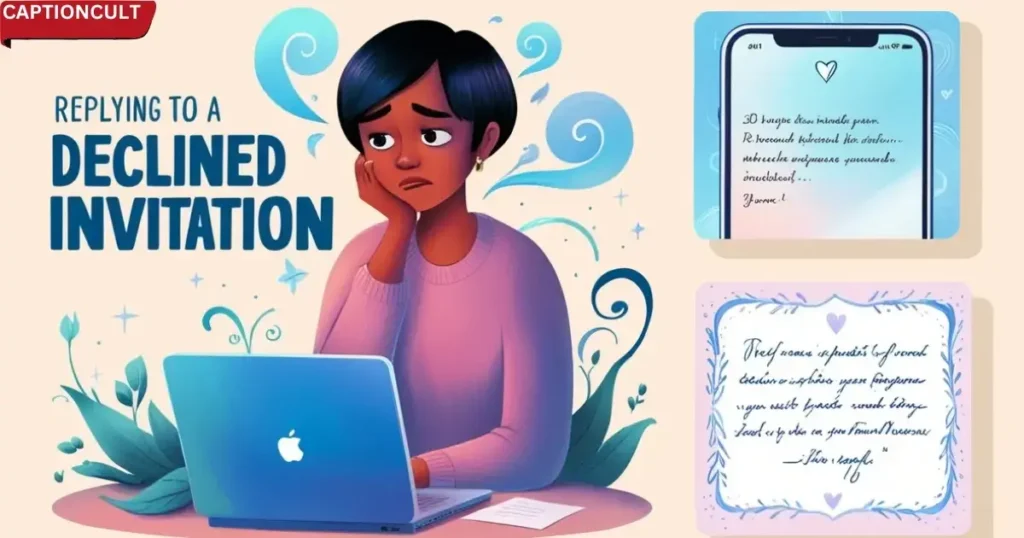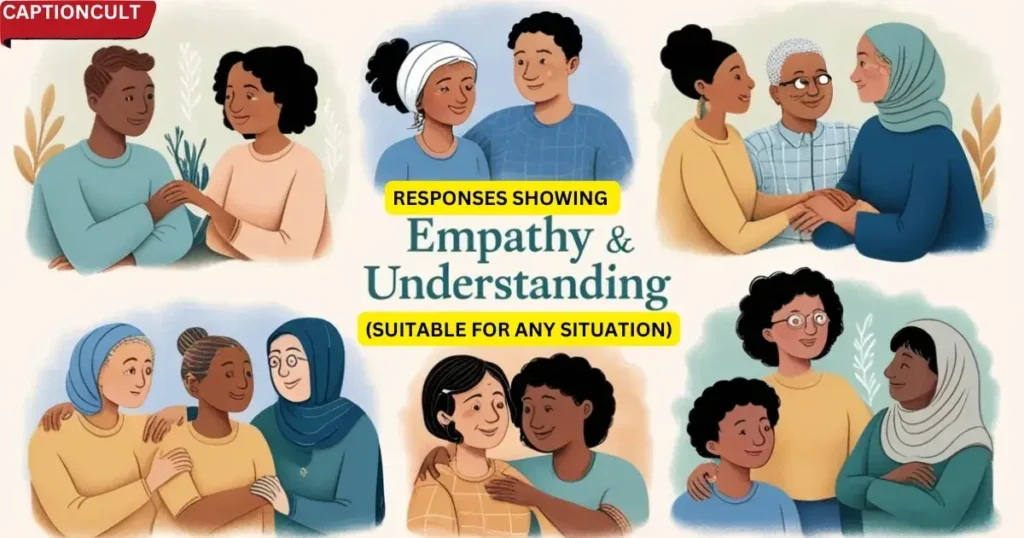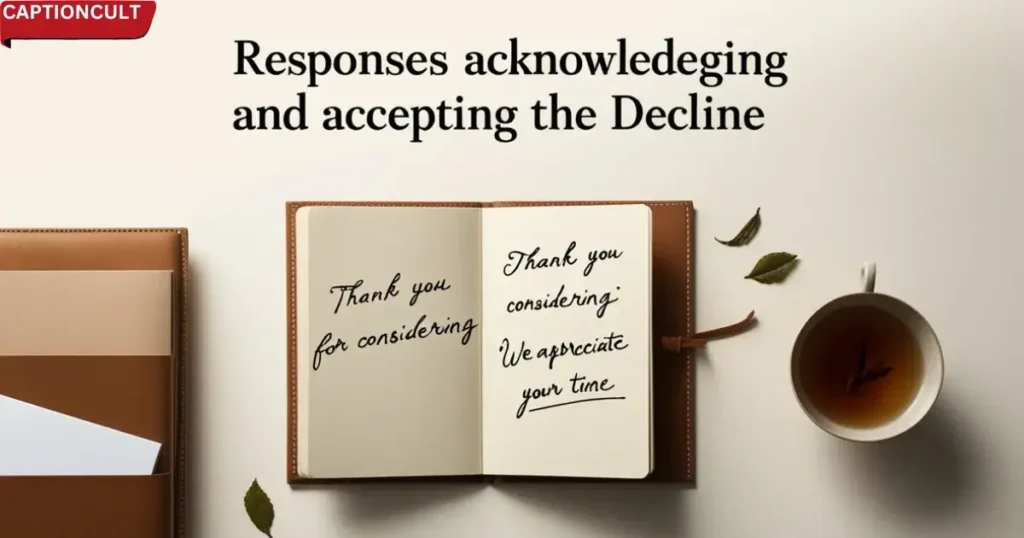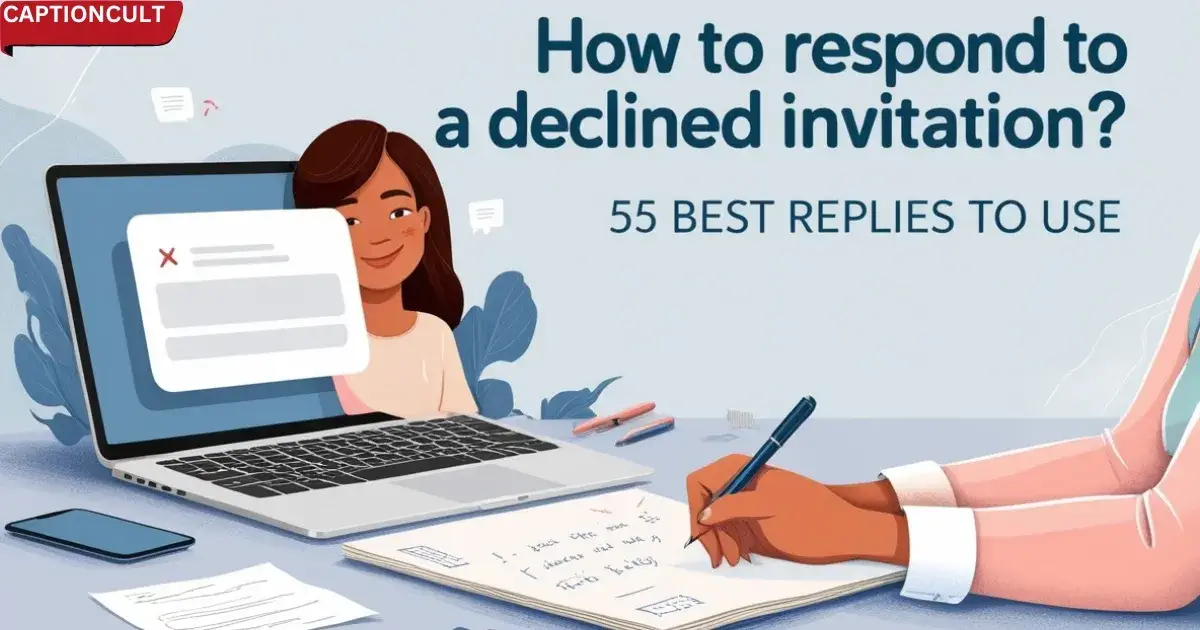Receiving a declined invitation can be a little disappointing, but how you how to respond to someone who cannot attend an event significantly impacts your relationship with the person. Knowing how to respond to a declined invitation with grace and understanding is crucial for maintaining positive relationships. This article provides a comprehensive guide, offering various responses suited for different situations and relationships, helping you navigate this common social scenario effectively.
We’ll explore various approaches, from casual to formal, and even incorporate a touch of humor where appropriate. Remember, the key is to acknowledge their response and maintain a positive connection. This guide focuses on how to respond to someone who cannot attend an event in a way that fosters understanding and avoids unnecessary pressure.
Understanding the Context: Why Your Response Matters
Before diving into specific replies, let’s understand the importance of responding appropriately to a declined invitation. Your response reflects your personality, your consideration for others, and your ability to handle social situations with grace. A poorly worded response can damage a relationship, while a well-crafted one can strengthen it.
The tone of your response is crucial. A curt or dismissive reply can leave the other person feeling bad about declining. On the other hand, a gracious response shows empathy and understanding, leaving a positive impression. Your aim should always be to acknowledge their decision without making them feel guilty or pressured. Whether you’re dealing with a friend declining a casual dinner or a colleague declining a professional event, understanding how to respond to someone who cannot attend an event is key to maintaining good relationships. Considering how to respond to someone who cannot attend an event professionally is particularly important in professional settings. The goal is always to preserve the connection and avoid any pressure.
55+ Replies to a Declined Invitation: A Comprehensive Guide

Here’s a diverse range of replies showcasing how to approach various scenarios while addressing how to respond to someone who cannot attend an event. Remember to tailor your response to your relationship with the person and the context of the event.
Casual Responses: (Suitable for friends and family)
- “No worries at all! We completely understand. Maybe we can catch up for coffee another time?” (Future Plans, Casual Response)
- “Totally get it! Things come up. Let’s plan something else soon.” (Understanding, Casual Response)
- “Bummer you can’t make it, but no problem at all! Hope you have a great night/weekend.” (Casual Response, Acknowledgment)
- “That’s okay! We’ll miss you, but hope you have a fantastic [day/evening/weekend].” (Casual Response, Empathy)
- “Raincheck? We’ll definitely have to do this again soon!” (Future Plans, Casual Response)
- “No stress! Life happens. Let me know when you’re free next.” (Casual Response, Understanding)
- “Ah, that’s too bad. We’ll miss you, but totally understandable. Let’s try again soon!” (Casual Response, Acknowledgment)
- “Completely fine! Have a great [day/night]! We’ll keep you in mind for the next one.” (Casual Response, Future Plans)
- “Darn! Hope whatever you’re doing is awesome. Let’s reschedule soon!” (Casual Response, Future Plans, Humorous Response)
- “It’s okay, things come up! We’ll miss you, but hope you have a great time.” (Casual Response, Empathy)
Formal Responses: (Suitable for colleagues, clients, or less familiar acquaintances)
- “Thank you for letting me know. I understand that things come up, and I appreciate you notifying me in advance.” (Formal Response, Acknowledgment, Gratitude, Professional Courtesy)
- “I understand. Please let me know if there’s another time you might be able to attend a future event.” (Formal Response, Future Plans, Professional Courtesy)
- “Thank you for your response. I hope everything is well.” (Formal Response, Acknowledgment, Professional Courtesy)
- “I appreciate you letting me know. I hope your schedule allows for participation in future events.” (Formal Response, Future Plans, Professional Courtesy)
- “Thank you for your prompt reply. We understand that commitments arise.” (Formal Response, Acknowledgment, Professional Courtesy)
- “No worries, we understand. We’ll keep you in the loop for future events.” (Formal Response, Future Plans, Professional Courtesy)
- “Thank you for letting us know. We appreciate you notifying us.” (Formal Response, Acknowledgment, Professional Courtesy)
- “I understand and appreciate your notice. We hope to see you at a future event.” (Formal Response, Future Plans, Professional Courtesy)
- “Thank you for your reply. We hope things improve soon.” (Formal Response, Acknowledgment, Empathy, Professional Courtesy)
- “We appreciate you letting us know. We wish you all the best.” (Formal Response, Acknowledgment, Professional Courtesy)
Responses Showing Empathy and Understanding: (Suitable for any situation)

- “That’s a shame, but I totally understand. Let’s catch up when things are calmer.” (Empathy, Understanding, Future Plans)
- “Oh, I’m so sorry to hear that! I hope everything works out. Let me know if there’s anything I can do.” (Empathy, Understanding)
- “I completely understand. Sometimes life gets in the way. Hope everything is alright.” (Empathy, Understanding)
- “No problem at all. I hope everything is okay.” (Empathy, Understanding, Acknowledgment)
- “I’m sorry to hear that; I hope everything is alright. Let’s try to get together another time.” (Empathy, Understanding, Future Plans)
- “It’s alright. Family always comes first. Hope everything works out well.” (Empathy, Understanding, addressing Family Commitments)
- “Don’t worry about it! I hope everything’s okay and you can relax.” (Empathy, Understanding)
- “No worries! Sometimes schedules just get out of control. Let’s plan something else when things settle down.” (Empathy, Understanding, Future Plans, addressing a Busy Schedule)
- “Totally understandable! Hope you’re okay, and let me know when things calm down.” (Empathy, Understanding, Future Plans)
- “No problem! We understand things come up, and that’s perfectly fine. Hope everything works out okay.” (Empathy, Understanding, Acknowledgment)
Humorous Responses: (Use cautiously, only with close friends)
- “Boo hoo, we’ll miss you! Just kidding! Hope you have a great [day/night/weekend].” (Humorous Response, Acknowledgment)
- “Aw, man! You’re missing out on all the fun! Just kidding (mostly). Let’s catch up soon.” (Humorous Response, Future Plans)
- “Seriously? You’re missing this? Okay, okay, just kidding. Hope you have a good reason!” (Humorous Response, Acknowledgment)
- “Noooo! But seriously, it’s totally okay. We’ll miss you though!” (Humorous Response, Acknowledgment)
- “Tragedy! Just kidding. We understand. Let’s do this another time.” (Humorous Response, Future Plans)
- “You’re missing out on the best party ever! Just kidding, let’s reschedule for when you’re free.” (Humorous Response, Future Plans)
- “Sad face! But honestly, no worries. Next time, right?” (Humorous Response, Future Plans)
- “Oh no! Anyway, we’ll miss you and hopefully catch up later.” (Humorous Response, Future Plans)
- “You’re missing out on epic levels of fun… but it’s okay. Let’s plan something else soon!” (Humorous Response, Future Plans)
- “Bummer you can’t make it, but hey, more cake for the rest of us! Just kidding… mostly! We’ll miss you.” (Humorous Response, Acknowledgment)
Responses Offering Future Plans: (Appropriate for most situations)
- “That’s okay, we’ll miss you. Let’s make sure to catch up soon.” (Future Plans, Acknowledgment)
- “No worries at all. We hope to see you soon.” (Future Plans, Acknowledgment)
- “That’s alright; we’ll definitely have to get together another time.” (Future Plans, Acknowledgment)
- “We understand; life happens. Let’s try to schedule something else soon.” (Future Plans, Acknowledgment, Understanding)
- “No problem! We’ll plan something else for you soon.” (Future Plans, Acknowledgment)
- “It’s alright! How about [suggest an alternative date/time] instead?” (Future Plans, Acknowledgment)
- “No worries! We’ll keep you in mind for the next event.” (Future Plans, Acknowledgment)
- “No problem! Let’s find another day that works for everyone.” (Future Plans, Acknowledgment)
- “That’s fine, we understand. We’ll be in touch to set up another gathering.” (Future Plans, Acknowledgment, Understanding)
- “It’s perfectly fine. We’ll try to coordinate something else soon.” (Future Plans, Acknowledgment, Understanding)
Responses Acknowledging and Accepting the Decline: (Simple and effective)

- “Okay, understood. Have a good [day/evening/weekend]!” (Acknowledgment, Understanding)
- “Thanks for letting me know.” (Acknowledgment)
- “No problem, thanks for letting me know.” (Acknowledgment, Understanding)
- “Okay, thanks for letting us know.” (Acknowledgment)
- “Understood, thanks for your reply.” (Acknowledgment, Understanding)
Additional Tips for Responding to Declined Invitations
- Stay calm and avoid overreacting: A declined invitation isn’t personal. Respond calmly and professionally.
- Avoid making them feel guilty: Never pressure someone into attending if they’ve already declined.
- Use humor sparingly: Humor can be a great icebreaker, but it’s crucial to know your audience. Avoid using humor in professional settings or with people you don’t know well.
- Be genuinely understanding: Empathy is essential. Let the person know you understand their situation without excessive probing.
- Don’t take it personally: Sometimes, people decline invitations due to reasons unrelated to you. This is especially true regarding busy schedules, family commitments, or unexpected circumstances. Focus on maintaining a positive relationship.
- Consider the communication channel: Your response should match the communication method used for the invitation (email, text, phone call). How to respond to someone who cannot attend an event professionally differs from how you would respond informally. A formal invitation letter requires a formal response.
- Maintain Professional Courtesy in professional settings: Always maintain professionalism when responding to a declined invitation in a professional setting.
FAQ: Addressing Common Questions
How do you respond to someone not attending an event?
Acknowledge their absence with understanding and perhaps suggest a future get-together. Keep the tone positive and avoid any pressure.
How do you respond when someone declines an invitation?
Express your understanding and appreciation for their letting you know. Depending on your relationship, you might suggest an alternative time.
How to respond to someone who can’t attend a meeting?
Thank them for letting you know and confirm the next steps, such as rescheduling or sharing meeting minutes. Maintain professionalism.
How do you write a reply telling that you cannot attend the event?
Politely decline, offering a brief explanation if comfortable, and expressing your regrets. Thank them for the invitation.
How to respond if someone doesn’t invite you?
Don’t overthink it; perhaps they had limited space or overlooked you. Focus on maintaining the friendship as normal.
How do you say sorry for not being able to attend a party?
Express your apologies and explain your reasons briefly, wishing the partygoers a fun time.
How do you say you won’t be able to attend an event?
Simply state that you can’t attend, offer a concise explanation if desired, and wish them well.
How do you apologize for not being able to attend an event email?
Write a concise email expressing regret and the reason for your absence, thanking them for the invitation.
How do you say I Cannot attend politely?
Offer a polite decline, stating that you cannot attend due to prior commitments or other reasons, while expressing appreciation for the invitation.
Conclusion
Learning how to respond to someone who cannot attend an event is an important skill for maintaining positive relationships. Whether you’re replying casually, professionally, or with humor, your response should always reflect empathy, understanding, and gratitude. By focusing on how to respond to a declined invitation, you can gracefully handle these social interactions and maintain positive connections. The use of empathy and gratitude will ensure that your response strengthens your existing relationships rather than causing any friction or misunderstandings. This process of replying appropriately is vital for building and maintaining robust relationships and shows emotional intelligence.
By keeping these principles in mind, you’ll navigate this common social situation with grace and poise. So, the next time you hear a “no,” remember: there’s no need to stress, because with the right reply, you can keep your relationships intact and even make plans for the future!

This is a passionate author whose work explores the power of language and storytelling. With a keen eye for detail and a commitment to excellence, Julian believes that every word has the potential to create meaning and beauty. “Where Words Find Perfection” is a reflection of his dedication to crafting narratives that resonate deeply with readers.

